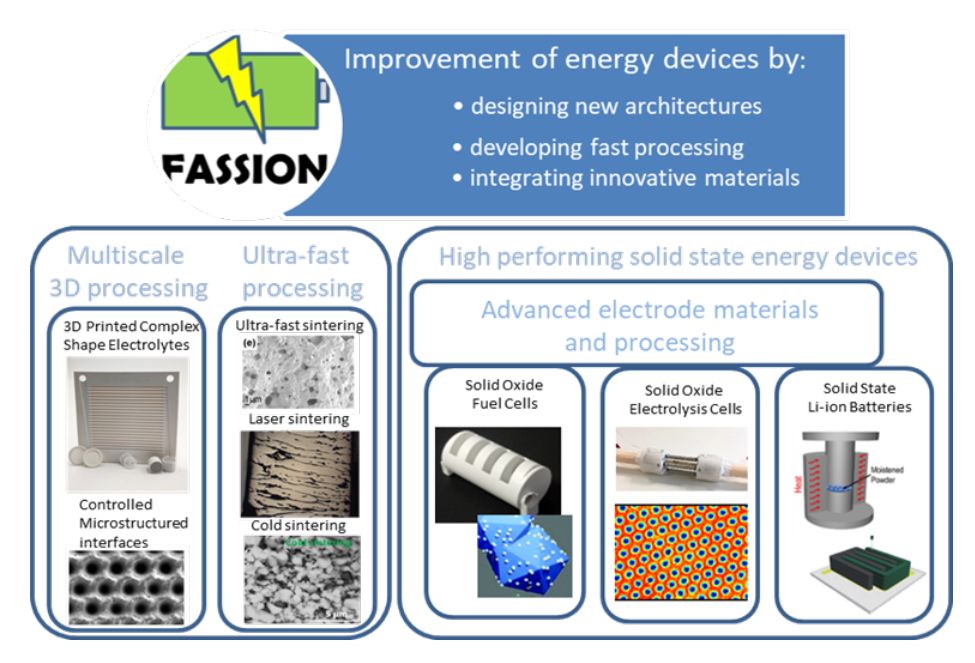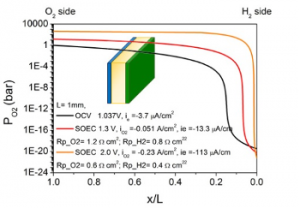If you would like to start research in any of our specialties, get in touch with us.
We are open to supervise Laboratory Stages for students in their final year of the degree, Academic Thesis works (Physics, Engineering Degrees, etc.), PhD´s, etc.
Specific open positions will be published below, of the following kind: GENERAL JOB OFFERS, PhD OPPORTUNITIES, supervision of GRADUATE THESIS (TFM or TFG).
Job Offers
LASE PROJECT
LASE project (Laser assisted sintering of electrolysers) is part of a recently launched joint project called FASSION between researchers at INMA (Zaragoza), IREC (Barcelona) and CIC Energigune (Vitoria). The project deals with the development of advanced ultrafast sintering techniques to process ceramics for the realization of a new generation of high-performance solid state energy conversion devices including Solid Oxide Fuel and Electrolysis Cells (SOFCs and SOECs) and All Solid State Li metal Batteries (ASSB).
Skills: We are looking for a motivated researcher with background in Chemistry, Material Science, Physics or Engineering and also a Master Degree finished (or about to finish). The selected candidate will be integrated in the PROCACEF multidisciplinary group at INMA (CSICUniversidad de Zaragoza), being also involved in different tasks between all partners.
Contract conditions: The contract will be performed with CSIC according with the standard salary rules, which will be based on the qualification of the selected applicant. The contract duration of the position will be of about 24 months, starting on March-April 2024.
Deadline and documentation: Please send your resumed CV including at least the names of two references and your degree qualification report. Deadline 15th February 2024.
- Contact details:
- Miguel A. Laguna-Bercero: malaguna@unizar.es
- Alodia Orera Utrilla: aorera@unizar.es

Graduate thesis works (TFM or TFG)
Academic Year 2022-2023
PCCF_TFG_Física_02 (FMC32)

DESCRIPTION
Las pilas de combustible y electrolizadores (SOEC) de óxido sólido se han convertido en una tecnología clave en la transición energética hacia un sistema más sostenible basado en combustibles como el hidrógeno. En estos dispositivos es clave el electrólito, frecuentemente el óxido circona dopada con itrio (YSZ).
El trabajo tiene como objetivo la determinación de la conductividad de minoritarios en cerámicas de circona codopadas con Y y Tb y se inscribe dentro de la investigación que sobre SOEC realiza el grupo PROCACEF.
Recientemente hemos establecido que dopar con Tb el electrolito YSZ es útil en la investigación de los altos gradientes de actividad de oxígeno que se generan en los electrolizadores en operación, causantes en algunos casos de degradación de las celdas en operación. Para ello es necesario el conocimiento preciso de la conductividad de los portadores minoritarios, electrones y huecos, en el electrólito.
El estudio de los conceptos y la ejecución de las tareas van a permitir al estudiante adquirir conocimientos y habilidades muy valiosos en el campo de la generación de hidrógeno mediante dispositivos SOEC y en ciencia de materiales.
El trabajo es idóneo para estudiantes de física con interés en ciencia de materiales y física de estado sólido. Utilizará y adquirirá habilidades de trabajo experimental y de resolución numérica de las ecuaciones diferenciales que gobiernan los experimentos.
TUTORES: Rosa I. Merino y Alodia Orera.
Search for PhD candidates
PCCF_PhD22_01: PhD position in the research of dual molten-carbonate CO2 transport membranes
Official call announced. Application Period: 12th to 26th January 2023.
Reference: PID2021-124863OB-I00

DESCRIPTION
This research is part of the project EUMEM, to be executed in the PROCACEF group at the Instituto de Nanociencia y Materiales de Aragón (INMA, https://inma.unizar-csic.es/en/home/). The laboratory is located in Zaragoza (Spain), where the student will be based. He/she will perform research stages in other labs, as could be the MatCORE group of the University of Newcastle which collaborates in this research.
Membranes are emerging as a promising option for carbon capture and storage (CCS) in precombustion or post-combustion processes, with advantages such as simple mechanical system, easy scale up and flexibility. Compared to the more advanced polymeric membranes, inorganic membranes provide high chemical stability as well as thermal, corrosion and mechanical resistance. Often, however, one has to choose among permeability and selectivity. In this scenario, dual membranes, based on molten-carbonate infiltration in a porous inorganic support, appear as a promising option because of their extremely high selectivity to CO2 versus N2 and other gases, and high permeability. Moreover, they can operate at high temperatures (400 to 700 °C), and are therefore well suited to separate CO2 from flue gas streams. Their concept proposal is quite recent, with first patent an publications dating 2005. Development of laboratory scale modules for pre-combustion processes (H2-CO2 separation) or bench scale modules for post-combustion processes based on this type of membranes are being currently pursued.
The EUMEM project objective is to disclose the operation mechanisms of this class of membranes that use oxide ceramics supports (zirconia, ceria, etc…) with micron size, long parallel pores produced by laser assisted solidification methods. At the same time, novel suitable supporting ceramic compositions which will present optimized functional performance are pursued. Along with this, manufacture procedures of those optimized ceramic supports, suitable to scalability will be developed.
This is an experimental, materials science research work which will endow the candidate with a broad knowledge and skills in ceramics manufacture and characterization techniques of solid state materials (structure, microstructure, electrochemical, spectroscopic, etc.). The PhD candidate research will focus more on manufacture issues or on functional materials properties and membranes depending on the candidate interest and abilities and the project development.
The project EUMEM is funded by the Programa Estatal de Generación de Conocimiento y Fortalecimiento Científico y Tecnológico del Sistema de I+D+i y del Programa Estatal de I+D+i Orientada a los Retos de la Sociedad, en el marco del Plan Estatal de Investigación Científica y Técnica y de Innovación 2017-2020.
HOW TO APPLY
- Send your CV and your bionote including your main achievements and academic records, as soon as possible and before 30th September 2022, to Rosa I. Merino ( rmerino@unizar.es). Add names and contact details of professionals who can provide references for the candidate. The reception of CVs will end when the official announcement for the PhD scholarship is published.
- Official announcement of the PhD scholarship: Follow the link. Start aprox. July 2023. Contract offer until the outcome of the official call is being considered. The most suitable candidates will be duly informed when the official call is open.
BENEFITS
- Salary and other conditions will be published with the official announcement for the PhD scholarship. Link.
- Duration: up to 4 years. The starting date will be determined by the selection process, and is expected around July 2023. Contract offer to cover the period until the outcome of the official call is being considered.
REQUIREMENTS
- Applicants should have a Graduate plus Master or equivalent degree in Physics, Materials Science, Chemistry, Engineering or related areas. Formal specific requirements detailed in the official call. The PhD will follow the doctoral program in Physics at the Universidad de Zaragoza
- Skills/Qualifications: We are looking for talented candidates with training and/or interest in materials science and highly motivated for research. The candidate has to be also proficient in English.
- Although not required, practical experience and knowledge in the following will be valued: Laser processing of materials, especially ceramics; Characterization of gas separation membranes; Electrochemistry.
